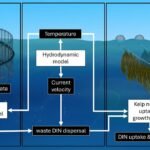The Belgian partners of the H2020-funded UNITED-project – namely Brevisco, Colruyt, Jan De Nul, Parkwind, Ghent University, Royal Belgian Institute of Natural Sciences – successfully harvested the seaweeds that had been growing in front of the Belgian coast since November 2020.
The cultivation trial focuses on sugar kelp (Saccharina) a species that can be used for human consumption or for the extraction of valuable compounds such as alginates which are widely used in the food industry.
As temperatures go up in late spring it is time to harvest the seaweed which does not tolerate high temperatures. Although seaweed has been farmed for several decades in Asia, and more recently also in Europe, seaweed cultivation typically takes place in sheltered locations. The southern North Sea with its strong currents and at times high wave action, however, presents a challenging environment for growing seaweed.
In the project “UNITED” which has received funding from the European Union’s Horizon2020 Research and Innovation Programme under grant agreement 862915, the Belgian partners of the consortium investigate the feasibility to grow seaweed offshore in combination with windfarms.
The seaweed cultivation complements efforts to assess the feasibility of cultivating European flat oysters (Ostrea edulis) in the Belgian part of the North Sea.
If successful, offshore seaweed cultivation could offer several benefits toward sustainable food production and potentially contribute toward a carbon neutral economy.
For more information on the UNITED project, please visit the websites:
https://www.h2020united.eu/pilots/2-uncategorised/42-offshore-wind-and-flat-oyster-aquaculture-restoration-in-belgium https://www.ugent.be/bw/asae/en/research/aquaculture/research/projects/united.htm .
Source: Ghent University
Stay Always Informed
Join our communities to instantly receive the most important news, reports, and analysis from the aquaculture industry.
Editor at the digital magazine AquaHoy. He holds a degree in Aquaculture Biology from the National University of Santa (UNS) and a Master’s degree in Science and Innovation Management from the Polytechnic University of Valencia, with postgraduate diplomas in Business Innovation and Innovation Management. He possesses extensive experience in the aquaculture and fisheries sector, having led the Fisheries Innovation Unit of the National Program for Innovation in Fisheries and Aquaculture (PNIPA). He has served as a senior consultant in technology watch, an innovation project formulator and advisor, and a lecturer at UNS. He is a member of the Peruvian College of Biologists and was recognized by the World Aquaculture Society (WAS) in 2016 for his contribution to aquaculture.






